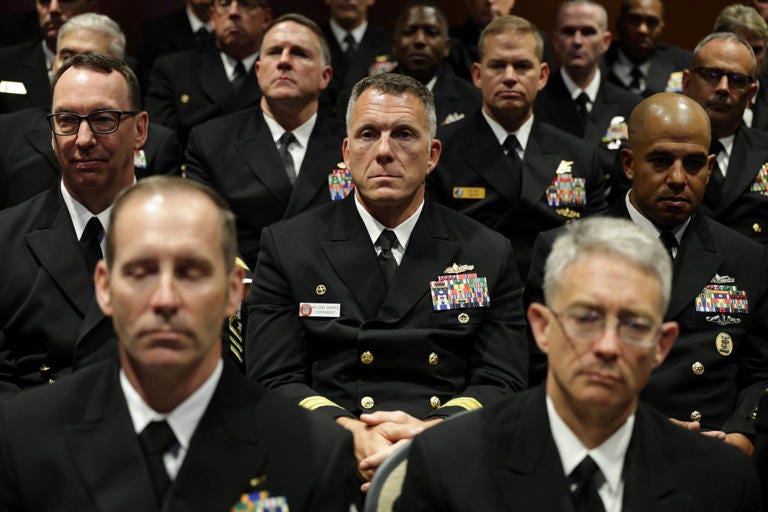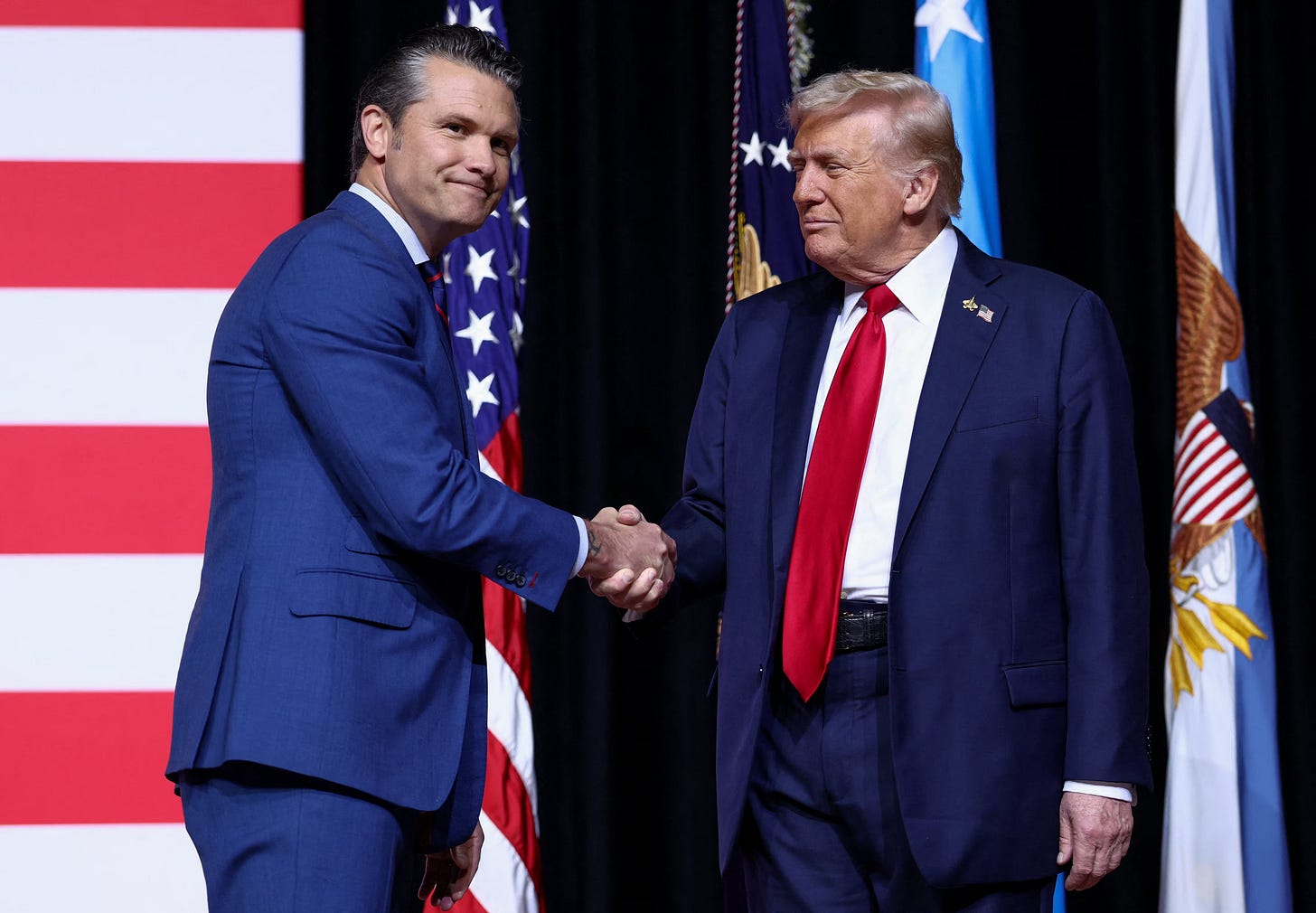Dark Times in the District, Part III The Silence of the Generals
The generals stayed silent. The question now is what happens when they don’t.
It was a scene that could have been lifted from Dr. Strangelove or 7 Days In May. Eight hundred generals and admirals summoned to Quantico. No teleconferencing, no excuses. Secretary of War Pete Hegseth stormed the stage, declared the Pentagon “too woke,” mocked overweight commanders, and rechristened the Department of Defense as the War Department.
Then Donald Trump took the podium. His warning was stark: America’s greatest threat was no longer abroad but within. He named U.S. cities as enemy strongholds. He told the highest ranks of the U.S. military to prepare for war at home.
The generals listened, but they did not respond. There was no applause, no protest. Only silence, the kind that hides calculation.
Rewind
In Dark Times in the District (August), I warned that Washington was shifting from partisan politics to structural power struggles. In Dark Times in the District II: Civilian Front (September), I mapped the fork: either Trump engineers a crisis to suspend elections, or the armed forces themselves break ranks.
Quantico was the first live test of that thesis.
The Event
Hegseth’s rhetoric was not policy debate. It was a cultural purge. By mocking generals’ fitness, by scorning diversity, and by renaming the department, he was declaring war on the institution itself.
Trump then turned the knife. By framing U.S. cities as “training grounds” for enemies, he blurred the line between foreign adversary and domestic opposition. In doing so, he laid the narrative groundwork for deploying force internally.
The silence that followed was heavy. It was not consent, but neither was it defiance. It was the silence of men weighing consequences.
The Scenarios
We remain at the fork.
Scenario One: The War Footing Gambit
A crisis, riot, terror, cyberattack, cartel war, even a prolonged government shutdown, is seized as proof of emergency. A war footing is declared. Elections are delayed or distorted under extraordinary powers.
Scenario Two: The Fracture
Orders cross the line: illegal domestic deployments, suspension of midterms. Senior officers refuse or resign. The rupture becomes visible. In extremis, the military itself could remove the commander-in-chief.
Scenario Three: The Long Slow Erosion
Institutions bend but do not break. Courts, Congress, and state governments resist enough to prevent open collapse. The corrosion of norms continues, quieter and no less corrosive.
What to Watch
The next six months are decisive.
In November and December, watch the promotions and purges. Who rises, who vanishes, who falls silent.
In January, expect the language to harden: “enemy within,” “exceptional measures,” “war footing.” Narratives precede orders.
By February, trial balloons will appear: emergency drills, deployment requests, brinkmanship dressed as law.
March is the fracture point. Either compliance calcifies or dissent surfaces. The silence breaks.
From Satire to Reality
When Kubrick made Dr. Strangelove, the absurdity was the point. Men in uniform calmly plotting apocalypse, laughter barely masking terror. When Gilliam made Brazil, the machinery of authoritarianism was grotesque precisely because it was bureaucratic, banal, ridiculous.
What we saw at Quantico was not satire, not cinema. It was real generals, in real silence, absorbing a president’s call to prepare for war at home.
And finally: It’s always been in the book
I have written before about Project 2025 and the figure of Stephen Miller. This is not improvisation. It is blueprint.
Project 2025, subtitled Mandate for Leadership, runs over 900 pages. Its aim is explicit: to place the entire executive branch under direct presidential control, sweep out independent agencies, and stack the system with “acting” loyalists who bypass Senate confirmation. One passage calls for dismissing all State Department leadership on Day One. Another nods to using the Insurrection Act as a tool to “secure the southern border.”
Its wider ambition is no secret. As one analysis put it: “to destroy the system of checks and balances and create an imperial presidency.”
Stephen Miller’s fingerprints are everywhere, whether or not his name appears on the spine. His career has been a rehearsal for this: collapsing judicial review, subordinating the Department of Justice, using immigration as the wedge to expand executive power. His own words echo the blueprint. At a recent rally he declared:
“We are the storm. And our enemies cannot comprehend our strength.”
When Hegseth renames the Pentagon, when Trump names cities as enemies, when Congress teeters into shutdown, none of it is free-floating chaos. It all resonates with the book’s structure.
That is why the silence of the generals matters. They are not only listening to a speech. They are standing inside a script already written.
And if the script continues, the next pause will not remain silent. It will fracture.
Closing
The dystopias of Strangelove and Brazil were designed to be cautionary. What we are witnessing now is their logic staged in real time. The absurd is becoming ordinary. The grotesque is becoming procedure.
The silence of the generals is no longer just unsettling. It is a warning.
What happens when it ends?



